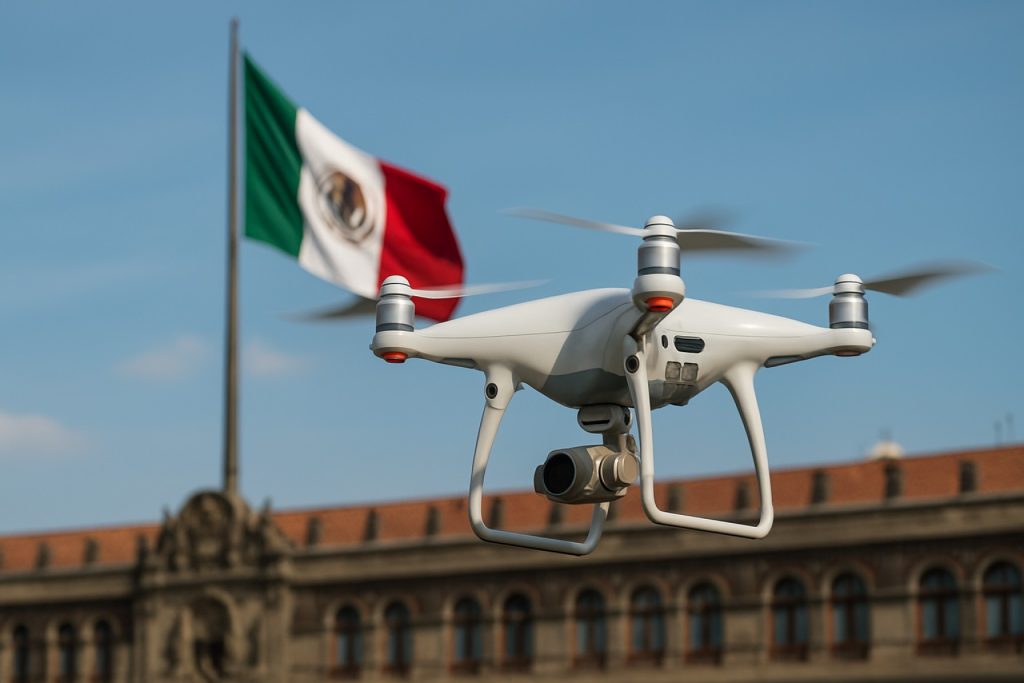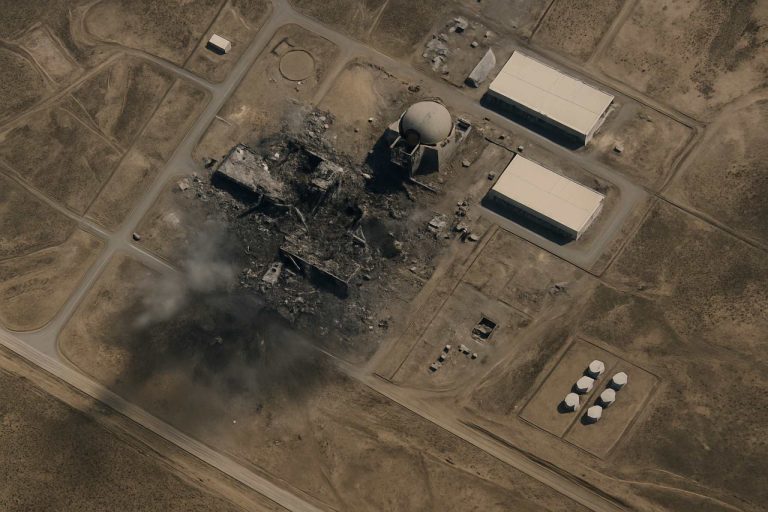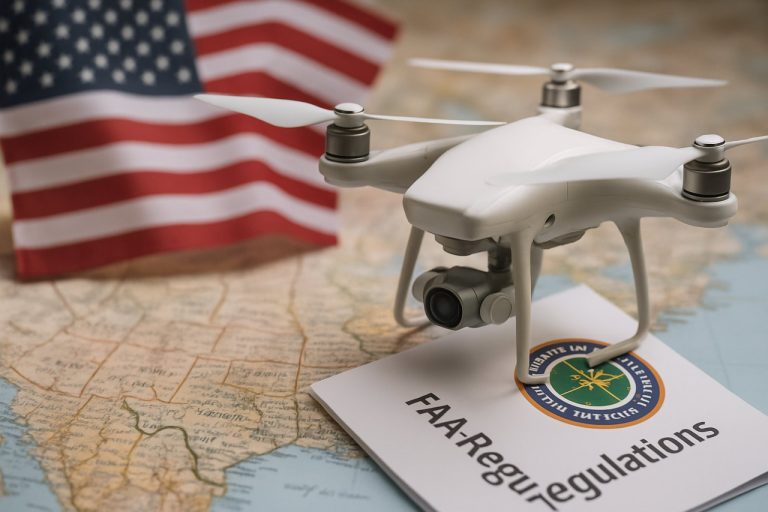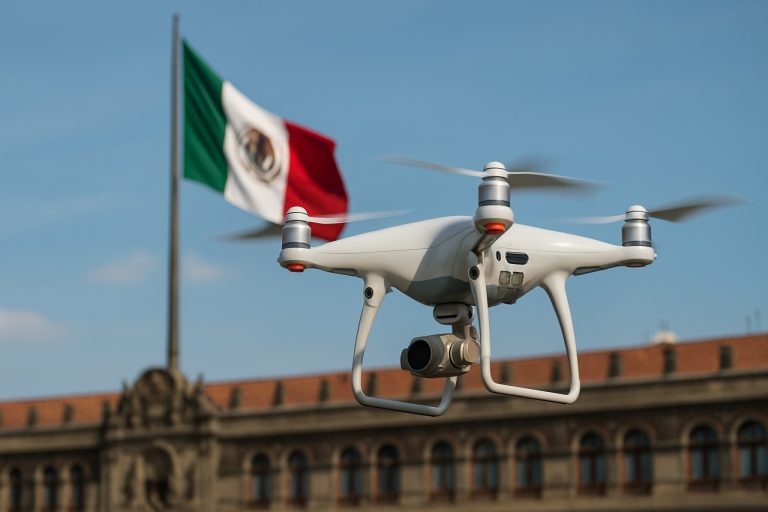
Unlocking the Skies: In-Depth Analysis of Mexico's Drone Laws, Regulatory Shifts, and Industry Impacts
- Market Overview
- Emerging Technology Trends
- Competitive Landscape Insights
- Growth Forecasts and Projections
- Regional Regulatory Analysis
- Future Outlook and Industry Trajectory
- Key Challenges and Strategic Opportunities
- Sources & References
“The summer of 2025 brought a surge of activity in digital health and telemedicine.” (source)
Market Overview
Mexico’s drone market continues to expand, driven by commercial, recreational, and governmental applications. As of 2025, the regulatory landscape is shaped by the Agencia Federal de Aviación Civil (AFAC), which oversees all civil aviation activities, including unmanned aerial vehicles (UAVs). The country’s drone laws are designed to balance innovation, safety, and privacy, reflecting both domestic priorities and international best practices.
- Registration and Classification: All drones weighing over 250 grams must be registered with the AFAC. The registration process requires proof of ownership, technical specifications, and, for commercial operators, a valid business license. Drones are classified into three categories: recreational, commercial, and governmental, each with specific operational requirements (SCT Press Release).
- Pilot Certification: Commercial drone pilots must obtain a Remote Pilot Certificate, which involves passing a theoretical exam and demonstrating practical flight skills. Recreational users are not required to be certified but must adhere to operational guidelines.
- Operational Restrictions: Drones cannot be flown above 122 meters (400 feet) or within 9 kilometers (5.6 miles) of airports. Flights over crowds, government buildings, and critical infrastructure are prohibited without special authorization. Night operations and beyond visual line of sight (BVLOS) flights require explicit AFAC approval (AFAC Regulations).
- Insurance and Data Privacy: Commercial operators must carry liability insurance. Recent updates emphasize data protection, requiring operators to inform individuals when collecting images or video in public spaces, aligning with Mexico’s INAI privacy guidelines.
- Recent Updates (2024-2025): In response to increased drone usage, AFAC introduced stricter penalties for unauthorized flights and expanded no-fly zones around sensitive areas. The agency also launched an online portal for drone registration and reporting incidents, streamlining compliance for operators (AFAC Drone Portal).
These evolving regulations aim to foster responsible drone integration into Mexico’s airspace, supporting industry growth while prioritizing public safety and privacy. As the market matures, further updates are expected, particularly regarding urban air mobility and autonomous drone operations.
Emerging Technology Trends
Mexico Drone Laws 2025: Regulations, Requirements, and Recent Updates
As drone adoption accelerates across Latin America, Mexico’s regulatory landscape is evolving to balance innovation, safety, and privacy. The Federal Civil Aviation Agency (Agencia Federal de Aviación Civil, AFAC) oversees unmanned aerial vehicle (UAV) operations, and recent updates reflect both technological advances and growing commercial use.
- Registration and Classification: As of 2025, all drones weighing over 250 grams must be registered with the AFAC. The process requires proof of ownership, serial number, and operator identification. Drones are classified into three categories: micro (up to 2 kg), small (2–25 kg), and large (over 25 kg), with increasing regulatory requirements for larger classes (AFAC).
- Pilot Certification: Operators of drones above 2 kg or for commercial purposes must obtain a Remote Pilot License (RPL). The certification process includes theoretical and practical exams, background checks, and a minimum age of 18 years. As of early 2024, over 5,000 RPLs have been issued nationwide (El Financiero).
- Operational Restrictions: Drones cannot fly above 120 meters (400 feet) or within 9 kilometers (5 nautical miles) of airports. Night flights, flights over crowds, and operations in restricted zones (e.g., government buildings, archaeological sites) are prohibited without special permits. The 2025 update introduces geofencing requirements for new drones to prevent unauthorized entry into sensitive airspace (Excélsior).
- Insurance and Data Privacy: Commercial operators must carry liability insurance. New privacy guidelines require explicit consent for aerial data collection over private property, reflecting concerns about surveillance and data misuse.
- Enforcement and Penalties: The AFAC has increased fines for violations, with penalties ranging from MXN 10,000 to 150,000 (approx. USD 600–9,000) depending on the infraction. Repeat offenders may face drone confiscation and criminal charges.
Mexico’s 2025 drone regulations aim to foster responsible growth in sectors like agriculture, logistics, and media, while prioritizing public safety and privacy. Ongoing updates are expected as drone technology and applications continue to evolve.
Competitive Landscape Insights
The competitive landscape for drone operations in Mexico is rapidly evolving, shaped by regulatory updates and increasing commercial adoption. As of 2025, the Federal Civil Aviation Agency (Agencia Federal de Aviación Civil, AFAC) remains the primary regulatory body overseeing unmanned aerial vehicles (UAVs) in the country. The latest regulations, published in late 2023 and effective through 2025, have introduced stricter requirements for both recreational and commercial drone operators, aiming to enhance airspace safety and align with international standards.
- Registration and Licensing: All drones weighing over 250 grams must be registered with the AFAC. Commercial operators are required to obtain a Remote Pilot License, which involves passing a theoretical and practical exam. These measures are designed to ensure accountability and traceability of drone activities (AFAC).
- Operational Restrictions: Drones are prohibited from flying above 122 meters (400 feet), over crowds, near airports, or in restricted airspace. Night operations and beyond visual line of sight (BVLOS) flights require special permits, which are granted on a case-by-case basis, primarily for industrial or research purposes (ICAO).
- Insurance and Data Privacy: Commercial drone operators must carry liability insurance. Additionally, new data privacy guidelines require operators to inform individuals when recording in public spaces, reflecting growing concerns over surveillance and personal data protection (El Financiero).
- Market Impact: These regulatory changes have increased compliance costs, favoring established players with resources to adapt. However, they also create opportunities for legal, training, and insurance service providers. The Mexican drone market is projected to grow at a CAGR of 12% through 2027, driven by demand in agriculture, infrastructure, and security sectors (Statista).
In summary, Mexico’s updated drone laws for 2025 are fostering a more structured and competitive environment. Companies that invest in compliance, pilot training, and privacy protection are better positioned to capitalize on the expanding market opportunities.
Growth Forecasts and Projections
Mexico’s drone market is poised for significant growth through 2025, driven by evolving regulations and increasing commercial adoption. The Federal Civil Aviation Agency (Agencia Federal de Aviación Civil, AFAC) oversees drone operations, and recent updates to Mexico’s drone laws are shaping the industry’s trajectory.
- Regulatory Framework: As of 2024, Mexico classifies drones by weight: micro (<2kg), small (2–25kg), and large (>25kg). All drones above 250g must be registered with AFAC, and commercial operators require a Remote Pilot License (AFAC). In 2023, AFAC introduced stricter requirements for insurance, flight logs, and geofencing in urban areas.
- Recent Updates: In late 2023, AFAC announced plans to harmonize Mexican drone regulations with international standards, particularly those of the International Civil Aviation Organization (ICAO). This includes mandatory electronic identification for drones over 900g and expanded no-fly zones around critical infrastructure and public events.
- Growth Projections: The Mexican drone market is expected to grow at a CAGR of 12.5% from 2023 to 2028, reaching a value of $1.2 billion by 2025 (Statista). Key growth drivers include agriculture, infrastructure inspection, and logistics, all benefiting from regulatory clarity and streamlined licensing.
- Compliance and Enforcement: AFAC has increased enforcement, with over 200 fines issued in 2023 for unauthorized flights and privacy violations (El Universal). The agency is also piloting a real-time drone tracking system in Mexico City to improve airspace safety.
- Looking Ahead: By 2025, experts anticipate further integration of drones into Mexico’s airspace, with new rules for beyond-visual-line-of-sight (BVLOS) operations and night flights under review. These changes are expected to unlock new commercial applications and attract foreign investment.
In summary, Mexico’s evolving drone regulations are fostering a safer, more robust market. Ongoing legal updates and enforcement efforts are expected to support sustained industry growth and innovation through 2025 and beyond.
Regional Regulatory Analysis
Mexico Drone Laws 2025: Regulations, Requirements, and Recent Updates
As drone adoption accelerates across Latin America, Mexico has updated its regulatory framework to address safety, privacy, and commercial opportunities. The Federal Civil Aviation Agency (AFAC) oversees unmanned aerial vehicle (UAV) operations, with the most recent amendments coming into effect in early 2024 and further updates anticipated for 2025.
- Registration and Classification: All drones weighing over 250 grams must be registered with AFAC. The process requires proof of ownership, drone specifications, and, for commercial use, a valid operator’s license. Drones are classified into three categories: Micro (<2kg), Small (2–25kg), and Large (>25kg), each with escalating requirements (AFAC Normativity).
- Operational Restrictions: Recreational drones must not exceed 120 meters (400 feet) in altitude and must remain within visual line of sight. Flights are prohibited over crowds, government facilities, and within 9 kilometers (5 nautical miles) of airports. Night operations require special authorization.
- Pilot Certification: As of 2025, commercial drone operators must complete AFAC-accredited training and pass a theoretical and practical exam. Certification is valid for two years and subject to renewal (AFAC Press Release).
- Insurance and Liability: Commercial operators are required to carry third-party liability insurance. Minimum coverage amounts were increased in 2024 to 1 million MXN (approx. $58,000 USD) per incident.
- Recent Updates: In response to increased drone usage in agriculture, logistics, and media, AFAC announced a streamlined digital registration portal and new guidelines for beyond visual line of sight (BVLOS) operations, expected to be finalized by Q3 2025 (AFAC 2025 Updates).
Mexico’s evolving drone regulations reflect a balance between innovation and public safety. Stakeholders should monitor AFAC’s official channels for the latest compliance requirements and operational guidance as the regulatory landscape continues to adapt to technological advances and market growth.
Future Outlook and Industry Trajectory
Mexico’s drone industry is poised for significant evolution as the country adapts its regulatory framework to keep pace with rapid technological advancements and growing commercial applications. As of 2024, the Federal Civil Aviation Agency (Agencia Federal de Aviación Civil, AFAC) oversees drone operations, with regulations outlined in the Normativity for the Use of Drones in Mexico. Looking ahead to 2025, several trends and anticipated regulatory updates are shaping the future outlook for drone operations in Mexico.
- Stricter Registration and Licensing: The AFAC is expected to implement more rigorous registration requirements for both recreational and commercial drone operators. This includes mandatory registration for drones weighing over 250 grams and the introduction of a digital licensing system, aligning with international standards set by the International Civil Aviation Organization (ICAO).
- Enhanced Airspace Management: With the proliferation of drones in urban and industrial sectors, Mexico is investing in Unmanned Aircraft System Traffic Management (UTM) solutions. These systems will facilitate real-time tracking and deconfliction, especially in congested airspace around major cities like Mexico City and Monterrey (AeroTime).
- Commercial Expansion and Industry Growth: The Mexican drone market is projected to grow at a CAGR of 12.5% through 2028, driven by applications in agriculture, logistics, and infrastructure inspection (Mordor Intelligence). Regulatory clarity and streamlined permitting processes are expected to further accelerate commercial adoption.
- Privacy and Data Protection: New amendments are anticipated to address privacy concerns, particularly regarding aerial data collection and surveillance. The National Institute for Transparency, Access to Information and Personal Data Protection (INAI) is collaborating with AFAC to establish clear guidelines for data handling and citizen privacy (INAI).
- Cross-Border and International Operations: Mexico is working with the United States and Canada to harmonize drone regulations, facilitating cross-border commercial drone operations and supporting the North American supply chain (US Department of Transportation).
In summary, Mexico’s drone regulatory landscape in 2025 will emphasize safety, innovation, and international alignment. Stakeholders should monitor AFAC announcements and participate in public consultations to stay ahead of regulatory changes and capitalize on emerging market opportunities.
Key Challenges and Strategic Opportunities
Key Challenges and Strategic Opportunities: Mexico Drone Laws 2025
As Mexico’s drone market continues to expand, regulatory frameworks are evolving to address safety, privacy, and commercial innovation. The Federal Civil Aviation Agency (AFAC) oversees drone operations, and recent updates to Mexico’s drone laws in 2025 present both challenges and opportunities for operators and businesses.
- Regulatory Complexity and Compliance: One of the main challenges is navigating the increasingly complex regulatory environment. As of 2025, all drones weighing over 250 grams must be registered with AFAC, and operators are required to obtain a Remote Pilot Certificate for commercial use. These requirements, while enhancing accountability, can be burdensome for small businesses and hobbyists (AFAC).
- Airspace Restrictions and Urban Operations: Drones are prohibited from flying above 122 meters (400 feet) and within 9 kilometers of airports. Urban operations require special permits, and night flights are generally restricted unless specific authorization is granted. These limitations can hinder the deployment of drones for logistics, surveillance, and emergency response in densely populated areas (ICAO).
- Privacy and Data Protection: With the rise of drone-based data collection, privacy concerns are intensifying. The 2025 updates include stricter guidelines on aerial photography and data storage, requiring explicit consent for capturing images of private property. This creates compliance challenges but also opportunities for companies specializing in privacy-compliant drone solutions (Diario Oficial de la Federación).
- Strategic Opportunities: Despite regulatory hurdles, Mexico’s drone sector is projected to grow at a CAGR of 12% through 2028, driven by demand in agriculture, infrastructure, and public safety (Statista). Companies that invest in regulatory compliance, pilot training, and privacy-centric technologies are well-positioned to capitalize on new market segments, including drone delivery and precision agriculture.
In summary, while Mexico’s 2025 drone laws introduce stricter requirements, they also foster a safer and more predictable environment for innovation. Stakeholders who proactively adapt to these changes can unlock significant growth opportunities in the evolving drone ecosystem.
Sources & References
- Mexico Drone Laws 2025: Regulations, Requirements, and Recent Updates
- AFAC
- El Financiero
- Excélsior
- ICAO
- Statista
- El Universal
- AeroTime
- Mordor Intelligence



